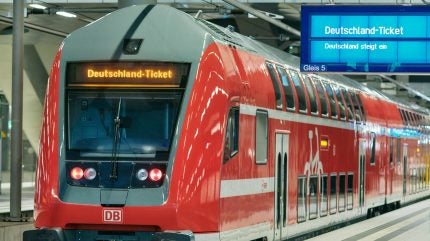
Germany’s national and local governments have committed to continuing the country’s unlimited rail travel ticket, Deutschlandticket, on the first anniversary of its introduction.
The €49 ($52.44) per month ticket is part of the government’s push towards public transport as a more sustainable form of transport and the state had already agreed on funding to finance the scheme through 2024, though details on future finances for the scheme were unclear.

Discover B2B Marketing That Performs
Combine business intelligence and editorial excellence to reach engaged professionals across 36 leading media platforms.
However, a recent conference of the country’s state transport ministers voted in favour of keeping the state subsidy for the ticket until at least 2036, sustaining the 50% share paid towards the scheme by regional governments.
North Rhine-Westphalia Transport Minister Oliver Krischer, chairman of the conference of transport ministers, said: “After just one year, 11.2 million people have a Deutschlandticket – and the trend is rising. This shows what added value the D -Ticket brings.
“It’s not just an incentive to switch to public transport, it also makes a contribution to climate protection and relieves people of billions of dollars in burdens.”
Krischer also said that he wanted to see further expansions of the Deutschlandticket scheme that allows companies to purchase a pass for their employees, saying that he still saw “great potential” in the idea.

US Tariffs are shifting - will you react or anticipate?
Don’t let policy changes catch you off guard. Stay proactive with real-time data and expert analysis.
By GlobalDataThe success of the ticket was also espoused by Germany’s national rail operator Deustche Bahn (DB) which said that since it was introduced in May 2023, passenger numbers on DB regional trains have increased by 28%.
The operator also revealed that half of the journey’s taken using the ticket were by people travelling to work or school but passengers were increasingly using it for leisure or weekend trips, with DB passengers travelling around 20% further now.
Germany’s federal government also affirmed its continued support for the Deutschlandticket, with national Transport Minister Volker Wissing describing it as “an integral part of people’s everyday lives.”
He said: “On the first anniversary of the ticket, I hope that we continue to work on improving the offer in this spirit. Digitalisation in particular still offers enormous opportunities here, more than half of tickets are now used on mobile phones, and 2/3 tickets were purchased digitally.
“In doing so, we have given public transport an enormous boost to digitalisation. We should build on this and, in the next step, make data usable to improve the offering.”
Wissing’s promotion of the digitalisation aspect of the Deutschlandticket was also supported by DB, with the operator stating that it believed the launch of the pass was partially responsible for the doubling of the number of tickets sold digitally.
The perceived success of Germany’s scheme has prompted other countries to look at similar schemes, with France’s former Transport Minister Clément Beaune announcing last year that his country was intending to introduce its own discounted rail pass.





